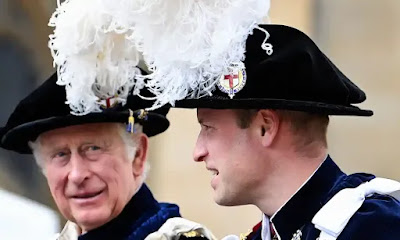Get ready for King Charles, the monarch who
speaks his mind
Simon Jenkins
He has described as ‘appalling’ the Tories’ plans to
deport asylum seekers to Rwanda. Don’t expect him to change
Mon 13 Jun
2022 18.03 BST
The
government’s decision to deport asylum seekers to Rwanda faces more serious
opposition than from the Prince of Wales. It has come from international
lawyers, Amnesty International, civil service unions, the weight of liberal
opinion and now the court of appeal. Even so, for the prince to reportedly
declare the prime minister’s policy on migration to be “appalling” is unusual.
Is it significant?
The answer
is no. A mountain of constitutional pomposity envelops Britain’s monarchy, as
if stepping an inch out of line presages a republican coup. Prince Charles is
not the monarch and even if he were, he would have no power over policy. He may
generate a headline or two when an aide or friend breaks confidence in
anonymous collusion with a newspaper. In the Rwanda case, widespread support
for the prince is due to the fact that many people happen to agree with him. But
anyway – so what?
Heirs to
the throne have no duty other than to stay alive. The thesis put forward by the
constitutional historian Vernon Bogdanor that they “must never say or do
anything that would embarrass” the monarch is mere public relations. It has
long been breached, notably by the heirs to Queen Victoria and to virtually
every one of the Georges, not least the future Edward VIII during the Great
Depression. Prince Charles has long voiced opinions on matters as diverse as
architecture, medicine and the environment. He has strong views and mostly
steers them clear of partisan politics, except perhaps for his reputed
(private) enthusiasm for the Social Democratic party in the 1980s. Somehow
monarchy retains its dignity, even amid the harmless, B-movie “thank you” of
this month’s jubilee celebrations.
Which
leaves open how the prince as king means to interpret the full range of
Bagehot’s constitutional duties imposed on the monarch, to “counsel, encourage
and warn”. He has adamantly asserted that as monarch he will be detached from
politics. In appointing ministers, summoning parliaments and signing bills, he
must do so robotically, without substance or discretion. Should the monarch
refuse on principle to sign a bill, as in Mike Bartlett’s 2014 drama King
Charles III, he knows he would have to abdicate. Meanwhile he can hardly hope
to keep his views on current affairs entirely to himself, running the
occasional risk of a broken confidence.
Perhaps as
king, Charles might risk a new deal. There are rumours that he hopes to reduce
the scale of the disparate royal family and its establishment. The flummery of
monarchy as a military costume drama is outdated, as is the extent of its
private London estate. Outdated, too, is the rejection of retirement, now
customary for monarchies across Europe.
In return
for a long-overdue modernisation, Charles might choose to play a more active
role in “counselling, encouraging and warning”. He has long contributed to the
cultural and intellectual life of the nation. Given a new informality and a
reduced profile, he could reasonably trespass on to some of the issues now
upheaving the nation that he clearly holds dear. He would have no power of
decision and no influence beyond that of debate. I am sure monarchy would
survive the shock.
Simon
Jenkins is a Guardian columnist










No comments:
Post a Comment